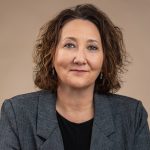
Nelli Babayan
Dr. Nelli Babayan is the AI Director at Microsoft, overseeing AI initiatives with all U.S. Federal Civilian agencies. She leads virtual cross-solution teams to advance mission outcomes, directing strategy and secure implementation of AI by fostering collaboration and developing mission-specific use-cases. She has delivered numerous talks and moderated panels at both US events such as GOVAI Summit most recently and international conferences, including in Canada, Italy, Germany, UK, France and other countries. Nelli supports AI efforts with her extensive and diverse background, having managed research and policy projects at DC-based think-tanks, lectured at universities, published in peer-reviewed journals, and led international projects.

Carrie Billy
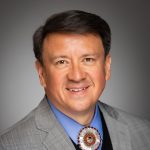 Geoffrey Blackwell
Geoffrey Blackwell
Geoffrey Blackwell is General Counsel and Chief of Staff for the National Congress of American Indians. Blackwell brings a wealth of knowledge and experience to NCAI, following eight years of service as the chief strategy officer and general counsel for AMERIND. Blackwell was the founding chief of the Federal Communications Commission’s (FCC) Office of Native Affairs and Policy, where he spearheaded efforts to bring modern communication technologies to tribal communities nationwide. In 2000, he also made history as the first enrolled member of a federally recognized Tribal Nation to work at the FCC. Blackwell has played a pivotal role in advocating for broadband policy on behalf of Tribal Nations. He has testified before Congress on seven occasions, and before the U.S. Commission on Civil Rights. In 2020, was honored as a co-recipient of Public Knowledge’s IP3 Internet Protocol Award.
In addition to his role as general counsel and chief of staff, Blackwell maintains active engagement in various national organizations. He serves on the boards of the Native American Rights Fund and the American Indian Policy Institute at Arizona State University. He has also dedicated his efforts to assisting Tribal Nations through involvement with the National Small Business Association, National Federation of Community Broadcasters, Native Public Media, Acoma Business Enterprises, and the Indigenous Commission for Communications Technologies in the Americas. Additionally, within NCAI, he assumes leadership responsibilities as co-chair of both the Economic, Finance, and Community Development Committee and the Technology and Telecommunications Subcommittee.
Raised in Oklahoma and New Mexico, Blackwell is Chickasaw, Choctaw, Omaha, and Muscogee Creek. He comes from a family deeply involved in tribal leadership and federal service dedicated to Indian Country. He is a graduate of Dartmouth College and the University of Virginia School of Law.

Nikki Borchardt Campbell

Diana Bowman
Diana M. Bowman is a full professor in the Sandra Day O’Connor College of Law, where she serves as the associate dean for international engagement, and the School for the Future of Innovation in Society. She is also a PluS Alliance Fellow (2016-2019) and team member of PlanetWorks in the Julie Ann Wrigley Global Institute of Sustainability.
Her research analyzes and informs the development of smarter governance and regulation of innovation in order to simultaneously enhance creativity, improve public health, and stimulate deliberation of the ethical, legal, and societal dimensions of emerging technologies.
Diana is an Andrew Carnegie Fellow (Class of 2018).

Leonard Bruce

Jason Carrizosa
As Chief Administrative Officer for our tribe, I bring over 16 years of dedicated service and a lifelong connection to our community. Born and raised on the reservation, my journey reflects the impact of our tribal programs, from my tenure as Fire Chief to my leadership in operational management, budgeting, strategic negotiations, and business innovation. Guided by a commitment to accountability, transparency, and economic growth, I work to ensure the long-term prosperity of our people while continuing to expand opportunities for future generations.


Sean Dudley leads the Research Technology Office, which provides specialized technology solutions and services that enable and protect ASU’s research community and sponsored projects. The office also organizes collaborative projects across the three state universities and supports the advancement of Arizona’s technological infrastructure.
Dudley began his career in research information technology in 1998 at the University of Wisconsin. His passion for blending scientific research and technology later brought him to Tempe, where he initially worked at the ASU Biodesign Institute in the Center for Evolutionary Functional Genomics. Soon after, he advanced to a leadership role among the Knowledge Enterprise that allowed him to develop and provide many services to ASU’s entire research community.
Dudley holds degrees in biology, computer science, and philosophy from the University of Wisconsin. He earned a Six Sigma Black Belt from ASU’s Ira A. Fulton Schools of Engineering and is currently pursuing a PhD at the School for the Future of Innovation in Society.

Matthew Fletcher

A professor at the College of Law since 2001, Tamara Herrera teaches a variety of courses, including Legal Writing and Method, Legal Advocacy, Writing for Law Practice, Indian Legal Research, and first-year Property. Her scholarly interests include legislative drafting and tribal law, as well as legal writing pedagogy.
Professor Herrera is a member of the Association of Legal Writing Directors and the Legal Writing Institute. From 2016-2020, she served as the Secretary of the Association of Legal Writing Directors. She is a past chair of the Environmental and Natural Resources Section of the Maricopa County Bar and a member of the State Bar of Arizona, the Federal District Court for the District of Arizona, and the United States Supreme Court. She writes a monthly column about legal writing for the Maricopa County Bar’s publication, Maricopa Lawyer. Following her graduation with distinction from the University of Nebraska School of Law, Professor Herrera practiced law at the firm of Ryley, Carlock & Applewhite in Phoenix. She performed complex legal research in water and Indian law; drafted proposed rules and legislation relating to natural resources issues in Arizona; and represented clients in both state and federal courts.
In addition to her law degree, Professor Herrera has a Masters Degree in Information and Library Science from the University of Arizona.
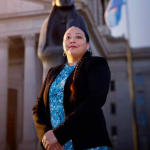
Mari Hulbutta
Mari Hulbutta serves as the Chickasaw Nation’s inaugural Director of Data Stewardship. She earned her Juris Doctor degree from Columbia Law School and her Bachelor of Arts degree from Columbia University. Mari is a proud citizen of the Chickasaw Nation and a descendant of the Seminole and Muscogee (Creek) Nations of Oklahoma.

Al Kuslikis
Leeds is the Dean of the Sandra Day O’Connor College of Law. Previously she served as Foundation Professor of Law and Leadership at the ASU Law. She is a scholar of Indigenous law and policy and an experienced leader in law, higher education, economic development and conflict resolution. She holds law degrees from University of Wisconsin (LL.M.) and University of Tulsa (J.D.), a business degree from University of Tennessee (M.B.A)., and an undergraduate degree in history from Washington University in St. Louis (B.A.).
Leeds was the first Indigenous woman to serve as a law school dean. She served as dean of University of Arkansas School of Law (2011-2018) and as the inaugural Vice Chancellor for Economic Development, University of Arkansas (2017-2020). She has been a professor and administrator at University of Kansas and University of North Dakota, and a William H. Hastie Fellow at University of Wisconsin. She is an elected member of the American Law Institute and a recipient of the American Bar Association’s Spirit of Excellence Award.
Leeds prioritizes public service at the national and local level. She is a former Cherokee Nation Supreme Court Justice and former Chair of the Cherokee Nation Gaming Commission. She currently serves as a founding board member and treasurer of the Foundation for America’s Public Lands, a congressionally-chartered non-profit. She is a corporate board member for Kituwah LLC (wholly owned business diversification company of the Eastern Band of Cherokee Indians) and board vice-president of Native Forward Scholars Fund (formerly American Indian Graduate Center).
Leeds is passionate about food, agriculture and wellness. She co-founded the Indigenous Food and Agriculture Initiative and now serves as board president of Akiptan (a Native CDFI providing capital to farmers and ranchers) and vice-chair of the board of trustee for the Native American Agriculture Fund (a private, charitable trust serving Native farmers and ranchers created from the historic Keepseagle v. Vilsack settlement).

Lewis is in his third term serving as Governor of the Community, having previously served as Lt. Governor. Prior to serving in elected leadership, Governor Lewis served the Community as a member of the Board of Directors for the Gila River Healthcare Corporation, as a Gaming Commissioner for the Gila River Gaming Commission, and as a member of the Board of Directors for the Gila River Telecommunications, Inc.
Lewis graduated from Arizona State University with a Bachelor’s of Science and pursued graduate studies at John F. Kennedy School of Government at Harvard University.
Governor Lewis currently oversees the implementation of the Community’s Water Settlement of 2004 (at that time the largest water settlement of its kind in United States history). Governor Lewis advocates for renewable and green technologies guided by O’odham agricultural history and cultural teachings. Governor Lewis’s vision is to support a new generation of Community member agriculturalists with the goal of promoting and protecting the Community’s shudag (water) and agricultural development.
During his tenure as Governor of the Gila River Indian Community, Governor Lewis has brought innovative solutions to long-standing issues that will create long-term gains for the Gila River Indian Community. One of these projects, Management Aquifer Recharge sites, brings together the need for access to water while restoring the return of the Community’s riparian area which is vital for farming and the return of wildlife to the Community. Bringing back the Gila River, which is critical to the culture and identify of the Gila River Indian Community, has been a key milestone during Governor Lewis’ Administration and one that will lay the foundation for future projects across the Community.

Gary Marchant is a Regent’s Professor of Law and director of the Center for Law, Science and Innovation. His research interests include legal aspects of genomics and personalized medicine, the use of genetic information in environmental regulation, risk and the precautionary principle, and governance of emerging technologies such as nanotechnology, neuroscience, biotechnology and artificial intelligence.
He teaches courses in Law, Science and Technology, Genetics and the Law, Biotechnology: Science, Law and Policy, Health Technologies and Innovation, Privacy, Big Data and Emerging Technologies, and Artificial Intelligence: Law and Ethics. He was named a Regents’ Professor in 2011 and also is a professor in ASU’s School of Life Sciences, a Distinguished Sustainability Scientist in ASU’s Julie Ann Wrigley Global Institute of Sustainability, and is a Lincoln Professor of Emerging Technologies Law and Ethics with the Lincoln Center for Applied Ethics at ASU.
Prior to joining ASU in 1999, Professor Marchant was a partner at the Washington, D.C., office of Kirkland & Ellis, where his practice focused on environmental and administrative law. During law school, he was Editor-in-Chief of the Harvard Journal of Law & Technology and editor of the Harvard Environmental Law Review and was awarded the Fay Diploma (awarded to top graduating student at Harvard Law School).
Professor Marchant frequently lectures about the intersection of law and science at national and international conferences. He has authored more than 150 articles and book chapters on various issues relating to emerging technologies. Among other activities, he has served on six National Academy of Sciences committees, has been the principal investigator on several major grants, and has organized numerous academic conferences on law and science issues. He is an elected lifetime member of the American Law Institute and a Fellow of the American Association for the Advancement of Science.
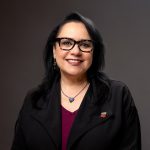
As a member of the Chickasaw Nation of Oklahoma, Traci Morris is a leading scholar on the subject of Tribal Digital Sovereignty, a term coined by Morris. Morris is an expert in tribal broadband and access and testified at the Federal Communications Commission and Capitol Hill.
Since 2014, Morris has been the executive director of the American Indian Policy (AIPI) Institute and is a research professor at the Sandra Day O’Connor College of Law. Under her guidance, the AIPI has expanded its services to Indian Country, collaborating with prominent organizations such as the National Congress of American Indians, and more. She currently serves on the Arizona Governor’s Office Interagency and Community Broadband Advisory Council.
Morris has worked with Native American nations, Tribal businesses, and non-profits. Her research and publications have focused on Internet use, digital inclusion, network neutrality, digital equity, and the development of broadband networks in Indian Country.

Mac Quig
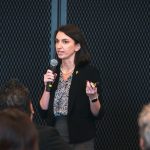
Elizabeth Reilley
Dr. Elizabeth Reilley is the Executive Director, AI Acceleration, with Enterprise Technology at Arizona State University. Previously at ASU, she worked in the area of Data and Analysis also within Enterprise Technology. Elizabeth has 15 years of experience in higher education working in Academic Affairs, Information Technology, and Strategy and Policy. She has a PhD in Educational Research, Measurement and Evaluation and an MBA from the University of North Carolina at Greensboro and a BA in Philosophy and Community and Justice Studies from Guilford College.

Rosier is the Assistant Dean of Institutional Progress and the Executive Director of Indian Legal Program (ILP) at the Sandra Day O’Connor College of Law at Arizona State University. She is an enrolled member of the Comanche Nation of Oklahoma. In this role Rosier leads the ILP’s recruitment and retention efforts and is in charge of the ILP’s development and grant work. Rosier served as Director of the ILP from 2000-2011 and returned as Executive Director in 2014. During her three-year absence from the ILP Rosier served as an Assistant General Counsel for the Fort McDowell Yavapai Nation. Prior to joining ASU, she worked as a tribal prosecutor for the Gila River Indian Community. Rosier received her J.D. from the University of Utah in 1998 and a BA from Capital University in 1993.

Grace Signorelli-Cassady
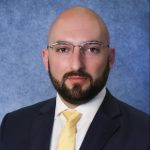
Max Spivak
Max Spivak serves as In-House Counsel for the Morongo Band of Mission Indians, a federally recognized Tribe. Max’s work for Morongo’s community, government, and enterprise stakeholders spans several practice areas for the ultimate purpose of protecting and advancing Tribal sovereignty.

Paula Starr
 Jon Tidwell
Jon Tidwell

Patrick Tinklenberg is the Vice President of Information Technology with Sycuan Casino where, for the last 10 years, he has been responsible for technology, strategy, and information security for the casino, hotel, and golf resort. Previously to his role with Sycuan, Patrick was the IT Director for the Barona Band of Mission Indians where he ran the IT operations at all tribal government service facilities, government-supported enterprises, and the Barona Gaming Commission. Patrick is also an active participant in the tribal technology community as a board member on both the TribalNet Gaming & Hospitality Board and the Tribal-ISAC Steering Committee.
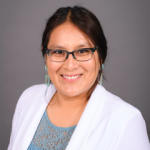
Krystal Tsosie (Diné/Navajo Nation), PhD, MPH, MA, is an Indigenous geneticist-bioethicist and Assistant Professor in the School of Life Sciences at Arizona State University. As an advocate for Indigenous genomic data sovereignty, she co-founded the first US Indigenous-led biobank, a 501c3 nonprofit research institution called the Native BioData Consortium.
Her research can be encapsulated in two main foci: Indigenous population genetics and bioethics. In particular, she focuses on bioethical engagement of Indigenous communities in genomics and data science to build trust. As a whole, her interest is in integrating genomic and data approaches to assess Indigenous variation contributing to health inequities.
She began her research career at the laboratory bench, where she developed and patented a combined targeted ultrasound imaging and chemotherapeutic drug delivery device for treating early metastases in cancer. Upon seeing the disparities in emerging genomics technologies, she switched fields to genetic epidemiology, public health, and bioethics. Her first Master of Arts in Bioethics at Arizona State University focused on the cultural implications of genetics in Native American communities. She added biostatistical knowledge and computational programming in large genomics datasets during her second Master’s in Public Health (genetic epidemiology) at Vanderbilt University, where she studied disparities in uterine fibroids in African American women. She has co-led an ongoing longitudinal genetics study in a North Dakota Tribal community. This project serves as one of few examples of community-based participatory research involving genetics in an Indigenous tribal nation.
Her research and educational endeavors have received increasing national and international media attention as scientists worldwide are understanding the importance of equitable, community-based engagement models and the importance of Indigenous genomic data sovereignty. Her work has been covered by popular media outlets including PBS NOVA, The Washington Post, NPR, New York Times, The Atlantic, Forbes, and Boston Globe. She currently serves on the Government Policy and Advocacy Committee for the American Society of Human Genetics and two National Academy of Medicine Committees on Emerging Science, Technology, and Innovation and Engaging Scientists in Central Asia on Data Governance. She is a current Global Chair in ENRICH (Equity for Indigenous Research and Innovation Coordinating Hub), which focuses on enhancing Indigenous rights to develop, control, and govern Indigenous data and supports participation in STEM and in digitally‐enabled futures.

Amanda White Eagle

Tyson Winarski is an Intellectual Property Law Professor and Patent Attorney with the Sandra Day O’Connor College of Law with Arizona State University. Tyson is also a technologist (BSME, MSEE) and inventor with over 52 patents in Artificial Intelligence (AI), blockchain, renewable energy, graphene optic fibers, nanotechnology, and social networking devices. Various technology companies have purchased or taken a license to Tyson’s patents. Tyson has also co-founded H2Gr0, an AI software start-up company focusing on sustainable fertilizer management for agriculture. At ASU, Tyson teaches courses on Strategic Protection of Artificial Intelligence and Emerging Technologies with Intellectual Property, Patent Law, Patent Licensing and Monetization, IP Licensing, and Appeals to the USPTO Patent Trial and Appeals Board. Tyson is also adjunct faculty on IP Law at the University of San Francisco School of Law.
Tyson serves on the Board of Directors for the Western National Parks Association, non-profit partner of the National Park Service. Tyson also served on the board of directors for the Grand Canyon Conservancy for six years, the official nonprofit partner of the Grand Canyon National Park.

